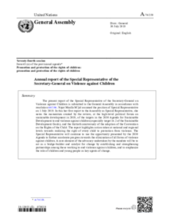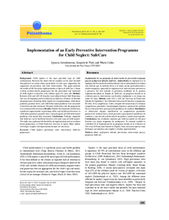Displaying 291 - 300 of 1090
The aims of this study were to examine rates of reentry and risk factors associated with reentry into out-of-home care among children and youth involved in the child protection (reported for abuse/neglect) and youth-in-conflict (reported for behavioral issues) programs.
The purpose of this systematic review is to synthesize existing research on community- and home-based interventions designed to improve parenting and reduce risk of maltreatment for families with substance-exposed newborns (SENs), applying a program logic framework.
This study examined whether global deficits in executive functioning (EF) mediate the association between severe childhood neglect and general v. specific psychopathology in adolescence. The sample consisted of 188 children from the Bucharest Early Intervention Project, a longitudinal study examining the brain and behavioral development of children reared in Romanian institutions and a comparison group of never-institutionalized children.
This report of the Special Representative of the Secretary-General on Violence against Children highlights action taken at national and regional levels towards realizing the right of every child to protection from violence.
This paper presents the results of the first pilot implementation in Spain of SafeCare, a home visiting evidence-based programme for the prevention and treatment of child neglect in families with children aged 0-5 years old.
This study was conducted to address some of the gaps in the current literature by identifying, in a more comprehensive manner, family profiles and service referrals in cases of child neglect investigated and substantiated by Child Protection Services (CPS) in Quebec.
This study was conducted to address some of the gaps in the current literature by identifying, in a more comprehensive manner, family profiles and service referrals in cases of child neglect investigated and substantiated by Child Protection Services (CPS).
This open access article details a culturally informed approach by sharing the findings of a Cultural Healing Program (CHP) designed, developed and delivered by an Aboriginal Community Controlled Organisation. The program was for Aboriginal survivors of institutional child sexual abuse who had also experienced cultural abuse having been forcibly removed from their families as children and in the process disconnected from their communities, culture and land.
In this chapter of the Handbook of Emotional Development, the authors discuss animal models that support developmental theories underscoring the importance of the caregiver–infant relationship for emotional development, explore how varying degrees of neglect may be differentially associated with subsequent emotional outcome, and review empirical work in this area from a developmental perspective by addressing how early neglect may impact the development of biological and behavioral mechanisms that underlie emotional functioning across multiple developmental periods.
There is no uniform definition of supervisory neglect and this creates challenges for measurement and identifying caregivers at risk. In this article definitional and measurement issues are discussed, as well as challenges in conceptualizing prevention.


